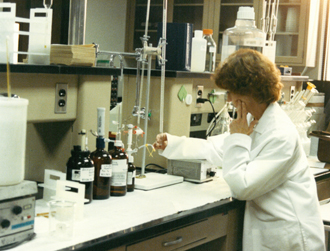Analytical Services


Whole Effluent Toxicity (WET) Testing is used to determine if wastewater discharge into receiving waters poses a potential risk of toxicity to aquatic organisms and ultimately, human health. NPDES permits include monitoring requirements using WET Testing to determine whether a wastewater has a reasonable potential to cause acute (lethal) and/or chronic (sub-lethal effects) toxicity in aquatic organisms.
BMI assists clients in all phases of WET Testing to help them reach compliance. In any given week, BMI monitors a minimum of 5o client site outfalls, totalling over 250 tests each year. We maintain both freshwater and saltwater species for WET testing at our aquatic laboratory. Our modern facilities are equipped with static and flow-through bioassay systems.
Call us to provide you with sound and defensible data for your discharge permit.
Benthic Macroinvertebrate Surveys
The benthic zone is the lowest level of a marine or freshwater system and includes the sediment surface, the water just above it, and some sub-surface layers. Macroinvertebrates live on, under, and around the rocks and sediment in this environment. These creatures are usually highly sensitive to pollution and, therefore, surveys of the macro-invertebrate population have become the most common means for assessing the health of an aquatic system.
We currently conduct benthic surveys at approximately 150 stations each year. Whether your needs are qualitative or quantitative, BMI can provide you with the professional expertise necessary to yield a credible macroinvertebrate survey.
Fish Surveys
An objective, discrete measure of the condition of the fish population, fish surveys are used for ecological risk or impact assessments. While most surveys can often be completed in the field by our qualified fish biologists, BMI laboratory staff can confirm more challenging field results.
BMI conducts fish surveys on streams using the latest U.S. EPA Rapid Bioassessment Protocols (RBP) based on the Index of Biotic Integrity. These results provide clients with the necessary data to develop biological criteria, prioritize sites for further evaluation, provide a reproducible impact assessment, and evaluate the trends of the fish population.
Fate and Effects Studies
Environmental Fate and Effects Testing is regulated under the Toxic Substance Control Act (TSCA) and the Federal Insecticide/Fungicide and Rodenticide Act (FIFRA). BMI offers a full range of environmental Fate and Effects testing. These studies will provide information on the mechanism, route and rate of substance degradation and risks these pose for human or environmental health.
We are able to monitor bioaccumulation in fish as well as develop non-routine studies to meet a specific situation (field and laboratory).
Product Registration
Both domestic and international organizations require chemical manufacturers to test their products in order to register them. The EPA mandates testing as a routine component of the Premanufacture Notice (PMN) process under the Toxic Substance Control Act (TSCA). If the material is to be exported, the testing may be required by the European Union in compliance with the Registration, Evaluation, Authorisation and Restriction of Chemicals (REACH) regulations or the Organization for Economic Co-operation and Development (OECD) guidelines.
BMI provides advanced product analysis and development services to chemical and pharmaceutical manufacturers. We help clients meet the requirements for Green Labeling and the creation of Global Harmonization System safety data sheets. Our laboratory is equipped for static, static renewal, flow-through toxicity testing and biodegradation testing. Contact us to learn more about our consultation services, protocol development and to discuss your testing concerns.
Other Analytical Services
In addition to standard laboratory testing, BMI is equipped to run artificial stream studies. Conducted in a flow-through manner, this approach increases reliability and enables realistic predictions of in-stream impacts. Typically, such studies are set up onsite to simulate some instream waste concentration or ambient condition.
Bioaccumulation studies address the buildup of bioaccumulative compounds such as Selenium through biomagnification and/or bioconcentration. BMI conducts these studies in both the laboratory and in the field. We maintain in-house cultures of many of the test organisms and apply the latest EPA and ASTM guidelines.
BMI has worked with federal and state agencies on behalf of clients to address issues concerning endangered species. We offer expertise in collecting and testing endangered species surrogates, including freshwater fish and mussels. Often, the client must provide the data to support their compliance, whereas the regulatory agencies often make claims with minimal actual data. BMI can provide you with the actual data needed to support a given position.
BMI offers sediment toxicity tests using EPA recommended organisms, for which BMI maintains in-house cultures. We have extensive experience culturing and examining many different species of freshwater, saltwater, and sediment organisms.
An Ecological Risk Assessment (ERA) is a multi-step process that requires problem formulation, characterization of exposure and ecological effects, and ultimately the characterization of the overall risk to the environment. To successfully complete an ERA, an understanding of the fundamental processes is needed, which can only be gained through years of experience. For over 40 years, BMI has assisted clients with assessments and advisory services to help your company manage risk.
BMI conducts plant toxicity tests in order to measure the toxicity of contaminated soils, sludges, sediments, and pure compounds by assessing the germination ability and root growth of plants when exposed to the compound in question. They are often used to ascertain the extent to which the soils on a contaminated site have been remediated.
A treatability study is a carefully devised laboratory-scale experiment designed to mimic full-scale environmental conditions as closely as possible. These studies are conducted in order to rapidly and cost effectively provide the client with real data on the effectiveness and/or efficiency of the treatment process in question.